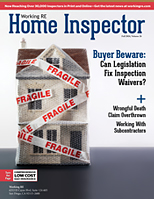 | > E&O/GL Insurance for Home Inspectors Competitive Rates, Broad Coverage, Free Risk Management, online inspection support for tough questions, discounts on education and more… Professional Coverage, Competitive Pricing Shop OREP today! |
Wrongful Death Claim Overthrown Due to Contract Clause
by Kendra Budd, Editor
After two years of back-and-forth litigation, the Georgia Supreme Court recently decided against holding a home inspector liable for the death of a man whose retaining wall collapsed on him. In a unanimous decision, the court ruled that the inspector’s one-year statute of limitations did not violate a state ban on hold-harmless provisions in construction contracts.
In addition, the justices held that the widow, who sued the inspector and the company he worked for on grounds of negligence when the inspector examined the structure of the retaining wall, had no claim to make against the defendants despite a March 2023 trial court ruling in her favor.
So, how did the court come to its decision? There is a lot to be learned and dissected from this case, including the importance of polishing and updating pre-inspection agreements as a home inspector. Here’s how it all unfolded.
A Deadly Leak
Albert Omstead was a husband and father of five who tragically lost his life in 2021 after a retaining wall at his home collapsed on him. The 38-year-old was known for his work in the camera and electrical departments of some notable Hollywood films including Captain America: Civil War and Baby Driver. Outside of his job he was often described as selfless and charismatic.
In an interview with Alive magazine, Omstead’s brother-in-law, Scott Wachtel, noted that, “He had his own kind of style, his own mojo, and he cared for everyone. Not fake cared but genuinely cared.” Wachtel also praised Omstead for the love he had for his children.
On July 19, 2021, rain caused a leak near Omstead’s garage. The driveway leading to the garage was protected by a retaining wall, which was the cause of the leak. Omstead decided to place a tarp and piece of particle board on top of the retaining wall in an attempt to divert the water away from the garage. As he was doing so, the wall suddenly collapsed on top of him. According to Wachtel, a van blocked his path to the garage, meaning Omstead wouldn’t have been able to run.
Omstead’s wife, Jessique, desperately tried to remove the heavy cinder blocks off her husband with the help of her neighbors. When firefighters arrived, they tried to use a carjack near the garage to free him, but it was no use. Albert Omstead died shortly thereafter from his injuries.
Inspections and Clauses
Before this tragic accident, the Omsteads were simply a family looking to purchase a new home. Once they found one to their liking, they did what most homebuyers do—hire a home inspector.
Home inspector James Golden was hired by the Omsteads in February 2020 through BPG Inspection LLC. According to court documents, Golden’s inspection report “provided numerous comments on items needing repair or posing health and safety concerns, but stated that ‘[l]atent, inaccessible, or concealed defects are excluded from this inspection.'” This meant the inspection was considered “non-invasive” of readily accessible systems, which followed the Standards of Practice of the American Society of Home Inspectors.
In his inspection report, Golden wrote that the retaining wall had been inspected visually and appeared to be functioning as it was intended. In fact, Golden did a follow-up inspection a month after his original to ensure he hadn’t missed anything at the Omsteads request. No defects or recommended repairs were identified in either the original or follow-up inspection reports concerning the retaining wall.
Then, five months after the inspection, Omstead posted a series of photos on Instagram, featuring the now-leaking retaining wall. The caption under the photos read, “There are cracks in the retaining wall that spit water when it rains, but no official drain holes.” These cracks are said to have caused the retaining wall to ultimately collapse. Jessique Omstead later argued that because Golden hadn’t noticed the cracks, he was negligent in his inspection and should be held liable for her husband’s death.
Fortunately for the inspector and BPG, Albert Omstead had signed off on a one-year limitation provision and damage cap contained in the pre-inspection agreement. The limitation read:
YOU MAY NOT FILE A LEGAL ACTION, WHETHER SOUNDING IN TORT (EVEN IF DUE TO OUR NEGLIGENCE OR OTHER FAULT), CONTRACT, ARBITRATION OR OTHERWISE, AGAINST US OR OUR EMPLOYEES MORE THAN ONE YEAR AFTER THE INSPECTION, EVEN IF YOU DO NOT DISCOVER A DEFECT UNTIL AFTER THAT.
This, of course, meant the Omsteads agreed that they had one year from the date of signing the agreement to bring forth any legal charges against BPG regarding their home and/or inspection. Since Omstead’s death occurred more than a year after the limitation ended, legally Jessique Omstead couldn’t sue BPG or Golden. Except, it wouldn’t be that easy for the inspector or the company.
(story continues below)
(story continues)
Trial Court
Despite the signed limitation, Jessique Omstead maintained the provision should be void and filed a wrongful-death claim against Golden and BPG two months after informing them of her husband’s death, resulting in BPG Inspection LLC v. Omstead. According to court records, the claim alleged “negligence, fraud, breach of contract and breach of warranty” against BPG and Golden.
In response, the defendants moved for a summary judgment, citing the signed limitation provision and damages cap and sought to enforce the inspection agreement’s limitations on liability as a whole.
Omstead then filed a cross-motion for summary judgments, asking the trial court to hold that the one-year limitation provision was void “as against public policy and, in the alternative, that the limitation did not pally Omstead’s claims because it is an exculpatory clause that must be read strictly against the drafter, and the clause only refers to claims for property damage,” court documents read.
Gwinnett County Superior Judge Joseph C. Iannazzone held a hearing for the case in which he denied BPG’s motion for summary judgment, concluding that “neither of the defendants’ contract provisions applied to the plaintiff’s case, and to the extent they did apply, they were both exculpatory clauses that were void as against public policy.”
Disagreeing with Iannazzone’s ruling, BPG Inspection then sought intervention from the Georgia Court of Appeals.
The Court of Appeals
On appeal, the defendants argued that Omstead’s wrongful-death action against BPG and Golden could not be pursued, citing the one-year limitation period had passed for filing a lawsuit. Meanwhile, Omstead again argued that the contract provisions did not apply to the wrongful death claim because they should be considered “void as against public policy.”
However, a Georgia Court of Appeals panel comprised of Judges Anne Elizabeth Barnes, Christopher McFadden and Benjamin A. Land concluded that the one-year limitation provision included within the Omsteads’ contract was both lawfully binding and enforceable, meaning the wrongful-death claim was well beyond the one-year limitation. The panel reversed and directed the trial court to enter summary judgment in favor of BPG Inspection.
In his 21-page opinion, Land wrote, “There is no ambiguity, and the contract is plain on its face … We accordingly reject plaintiff’s argument that the one-year limitation provision does not apply.” Land also wrote that parties to a contract are “free to contract on any terms and about any subject matter in which they have interest,” so long as it isn’t prohibited by statute or public policy, and cannot be “left to speculation.”
However, Omstead wasn’t done fighting and challenged the intermediate appellate ruling to the Georgia Supreme Court.
Taking it Further
Georgia’s highest court granted a review of the case in March 2024 to “consider whether the Court of Appeals erred in approving the one-year limitation and whether the limitation is void as against public policy,” according to court documents.
The case was argued orally on March 21. This time, Omstead argued that the second inspection made by Golden wasn’t covered by the inspection agreement, citing specific language in the contract that read: “This fee is based on a single visit to the property.” Essentially, the plaintiff argued that the re-inspection was separate from the original and, therefore, lacked a second agreement.
The defense countered that a follow-up inspection is not the same as ordering a second inspection. In fact, the follow-up inspection was organized by the Omsteads to ensure that the recommended repairs by Golden were made. Omstead herself did not dispute this fact during oral arguments. Thus, the second inspection “flows directly from the Inspection Agreement, and the evidence on which Omstead relies does not create a genuine issue of material fact as to whether the second inspection was covered by the Inspection Agreement,” Supreme Court documents state.
Omstead also argued that the one-year limitation should not be enforced because it contractually avoided the professional standards of conduct, which violated the outcome of Porubiansky v. Emory University. In that case, a patient sued Emory University School of Dentistry Clinic for malpractice. Emory asserted that the signing of an information-consent form was a complete bar to the action. Eventually, the Georgia Supreme Court ruled that licensed professionals had to uphold a statutory duty of care in Georgia, and therefore couldn’t limit the statute limitations.
However, in BPG Inspection LLC v. Omstead, the Georgia Supreme Court stated that Porubiansky was distinguishable, and that the “statutory backdrop in Porubiansky, which reflected ‘the strong policy of the state … to regulate those professionals that it licenses,'” was not present in this case because Georgia doesn’t require home inspectors to be licensed.
After careful consideration over three months, the Georgia Supreme Court (with the exception of Justice Andrew Pinson, who was disqualified from deciding on the matter) sided with the defendants, concluding that the one-year limitation was enforceable and that provisions could not be void as against public policy. In the court’s 28-page unanimous order, Justice Carla Wong McMillian outlined:
“Omstead offers no case where we have rejected a contractual provision like the one-year limitation in this case on the grounds that the limitation period expired before a party’s claims accrued or on the grounds that the limitation period deprived a party of the opportunity to bring a claim. And given our longstanding caution in interfering with the freedom of parties to contract, our silence on ‘contractual repose’ periods is not enough for us to declare them void or unenforceable. Moreover, while we have not found a case from this Court considering whether to enforce a contractual limitation provision precisely like the one here, we have long enforced contractual provisions setting a time period in which a party can file an action, even when that period is shorter than the one, if any, set by statute—that is, even when the period functions to deprive a party of the chance to file suit where the law would otherwise permit suit.”
Further, Omstead claimed that the one-year limitation should have been rendered void for allegedly violating state law prohibiting indemnification and hold-harmless clauses in contracts that pertained to construction or maintenance of property. McMillian countered this claim, stating the one-year limitation did not require Omstead to reimburse any damage to BPG or Golden.
“… the limitation only requires Omstead to ‘not file a legal action’ after one year from the inspection,” the judge clarified. Though the vote to uphold the Georgia Court of Appeals decision was unanimous, Justice Nels S. D. Peterson acknowledged he had some “unresolved questions” about where a line should be drawn to decide if a limitation period is too short to enforce:
“There may not be just one line; it seems reasonable to think that the subject matter of the contract is relevant to how long a period must be. For example, a sufficient limitations period for a contract for replacement of brake pads could likely be shorter than the limitations period would need to be for a contract for construction of underground infrastructure, where one would expect a defect to take longer to become noticeable. And if that’s so, a contract for building inspection, like the one at issue here, would seem to be closer to the latter.”
Despite that stance, Peterson believed it was too difficult for the court to draw those distinctions in a principled manner, and he didn’t “see a clear legal basis under [the court’s] precedent for doing so in a way that sets the line at more than one year in this case.” Finally, Peterson also said it was up to the legislature to draw those conclusions, not the Georgia Supreme Court, thus settling the matter once and for all that BPG and Golden could not be held liable for the death of Albert Omstead.
(story continues below)
(story continues)
Protecting Your Business
Though it’s unusual for litigation involving a home inspector to reach a state supreme court, the big takeaway from this case for inspectors nationwide should be the important role contracts play in protecting your business. Experienced trial attorney Geoff Binney, managing partner at Woodlands, Texas-based Gauntt, Koen, Binney & Kidd LLP, says it’s paramount inspectors have a pre-inspection agreement in place. “Have something in writing,” he says. “The days of being able to just go out there and do your best and think that that’s going to be sufficient to keep you out of litigation are over.”
In addition to making sure a pre-inspection agreement is signed prior to performing services, Binney advises including the following key clauses to help deter lawsuits and strengthen a case in court:
• Limitation of Liability Clause
• Attorney’s Fee Clause
• Notice/Waiver Clause
• Statute of Limitations
• Indemnification Clause
Even though the statute of limitations was upheld in BPG Inspection LLC v. Omstead, Binney warns that inspectors shouldn’t get too comfortable in thinking the outcome would be the same everywhere. “[This case] only applies to Georgia home inspectors,” says Binney. “The enforceability of these types of provisions is different in each state.”
“Clearly, [a statute of limitations] helps because [homeowners] have less time to move, less time to act, and oftentimes it does take a little while for them to notice that there’s a potential problem to the point where they’re willing to file a lawsuit,” he continues. Thus, Binney urges all home inspectors to research whether this type of clause is enforceable in their state before including one in a pre-inspection agreement.
It’s particularly notable that Binney, who has built his practice around construction-defect litigation, first-party insurance defense work and home inspector claim defense cases, found the conclusion of the Georgia case surprising compared to how courts in other states might predictably rule under similar circumstances.
A key differentiator in the Georgia ruling was the absence of a licensing requirement for home inspectors in the state, which is why the justices found Omstead’s limitation argument from the Porubiansky case irrelevant. “In most states, their home inspectors are licensed,” explains Binney, “So, if a Texas court, for example, was to look at this exact same situation, they might find [the limitation] unenforceable.”
Although a limitation of liability clause is legal in most states, Binney cautions home inspectors, including those in Georgia, not to become “too emboldened” by this case win. Inspectors should take time to research what is legal and not in their state and consult with their legal counsel to ensure their contracts are as strong as possible. “The more protections that you can have in your contract, the better,” says Binney, otherwise, you could diminish your defense in court.
Final Thoughts
Though the Georgia Supreme Court had some difficulty arriving at a ruling, the justices ultimately upheld the liability deadline Omstead acknowledged and signed.
The importance of fine-polishing your home inspection agreement with indemnification clauses should not be ignored. In the Georgia case, it may have saved Golden and BPG Inspection from financial ruin. Home inspectors should make sure their pre-inspection agreements are updated regularly, conspicuous and in adherence with state law.
Read more about what makes a good pre-inspection agreement at WorkingRE.com. Stay safe out there!
About the Author
Kendra Budd is the Editor of Working RE Magazine and Marketing Coordinator for OREP Insurance. She graduated with a BA in Theatre and English from Western Washington University, and with an MFA in Creative Writing from Full Sail University. She is currently based in Seattle, WA.

OREP Insurance Services, LLC. Calif. License #0K99465



